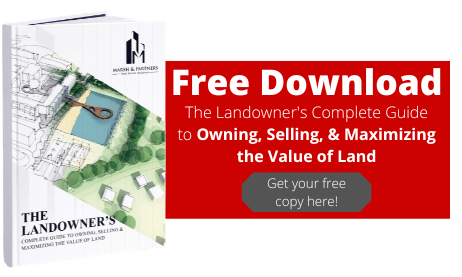Land Ownership 101: Everything Landowners Need to Know for Land Success
Most people don't really understand land - the due diligence required, how to estimate sitework & development costs, or the land entitlement process and project permitting.
And because land is so complex, landowners are often the forgotten class of real estate owners. There isn't a ton of information out there to help them navigate the complicated decisions regarding land values, ownership, and land exit strategies.
The video below offers landowners a crash course on everything they need to know to successfully own and eventually exit their land investment.
Guide to the video
- The comparable sales ("comp") approach to property valuation isn't adequate for land. Owners should consider how a real estate developer will value a property
- Determining when to sell a piece of land is influenced by macroeconomic and local market factors as well as your personal goals
- Landowners can maximize the value of their land by pursuing land entitlements before selling the property
Video transcript follows
There is a ton of information out there on real estate. You can find just about anything you want on wholesaling, fix and flip strategies, buy, rehab, rent, refinance, and hold strategies, and even real estate syndication and fundraising. Some of it is good information and some of it not so good.
What there isn’t a ton of quality information on is land. Landowners are the forgotten class of real estate owner – there is a lot of them out there, with a lot of questions, sitting on a lot of quality pieces of land, without much direction on how or when to sell it and how to maximize its value.
So, if you’re a landowner, you’ll want to keep watching this video. I’m going to offer some tips landowners can use to increase the value of their land, whether they are thinking about selling or not. I’m also going to help owners determine when is that right time to sell their land, and cover a couple of different strategies they can use to sell their land effectively while also minimizing a tax burden.
So, stick around for all that and more.
What’s up everyone – it’s Matt Marsh with Marsh & Partners.
Marsh & Partners is a development and national consulting firm that helps business owners and investors maximize their real estate and transform their businesses.
If you’re enjoying what we’re doing here, and want to keep seeing more content like this, please hit that like button and share this video and our other videos with people you think might find some value in it.
----------
Since I became a real estate developer and began reaching out to landowners directly, I noticed a common theme between a lot of my conversations. Most landowners have no idea about the property they were sitting on.
And it isn’t because people who own land are any less savvy than someone that owns a physical piece of real estate. Really, it’s because there aren’t a ton of people out there that truly understand land.
What it takes to sequence your land entitlement tasks. Or what it takes to get a project approved. Or the real state due diligence that’s required before a developer can break ground on a commercial project or build houses.
Even many real estate developers don’t completely understand the process. And the ones that do keep that information close to the chest because trade secrets like that are what win in this business.
But that mentality doesn’t serve anyone justly. And it creates a situation of misaligned incentives between landowner and buyer or developer.
So, when I’d sit down with landowners, I’d try to be as objective as possible in explaining the asset they had and what my intentions were with the property.
I’d walk them through the investigative work that I’d need to do to determine if my project was feasible. I’d explain timelines, key milestones and decision points, and the dollars I would invest myself. That way, they’d better understand their land and what it would take for me to develop it, my potential profits, and ultimately what I could pay them for it.
And from there, we’d either strike a deal or we wouldn’t. But the important thing was that I never won the deal because I got one over on the owner.
But I mention all that because I think it highlights that land is misunderstood because land development is such a challenging and complicated process. So, my goal in this video will be to break down some of those barriers for landowners, and help them understand, from a real estate developers’ perspective, what you need to know to make more informed decisions about your property.
How to value land
The most common approach to valuing a property is by using the comparable sales, also known as the “comp” approach.
Essentially, you look at similar properties that recently sold in your market and extrapolate a price/acre based on the sales price. You can then apply that price/acre to your property and determine a land value. This is a quick and easy way to get a ballpark estimate of your property value.
But this approach doesn’t account for the fact that every piece of land is unique, much more so than houses and even commercial properties. To really determine a land value, you need to understand how a buyer or real estate developer will value the property.
So, I want to give you a crash course on how a land developer will assess your property.
At the end of the day, developers are driven by potential profits. Otherwise, a project wouldn’t be feasible, and no bank would ever lend on a project if there wasn’t potential upside.
That means that very simply, land value is based on the potential future income that can be generated from a property. But what does that mean exactly?
Think about it this way. Every property has a distinct topography, access to utilities, requires different off-site improvements, may contain streams or wetlands and require a stream & wetland delineation, and possibly involve different site plan requirements.
So, until you’re really analyzing a specific property in depth, value is largely theoretical. But that’s why as a landowner it’s important to understand how land value is derived and how a real estate developer would assess your property.
Because once a real estate developer understands what’s involved with developing a property, and they consider highest and best use and its potential future income, they’ll be able to “back into” a land value that makes sense for their project.
When is the right time to sell?
When is the right time to sell your land as a landowner? That’s a heck of a question. Oftentimes, there is no right or wrong answer, but it’s a question that’s informed by land values, market forces, and personal goals.
I already gave you a crash course on land valuation as it relates to how a buyer or real estate developer would value a property.
But what about market forces and how they impact when a landowner should sell their property? There are 3 important characteristics to consider:
1. Cultural shifts and macroeconomic dynamics: First is cultural shifts and macroeconomic dynamics. As cultures evolve, people’s preferences change to how they live and work. COVID is a great example of this. We saw an unprecedented domestic migration out of certain cities and regions into sunbelt areas.
Even within markets people placed an emphasis on having a little more space rather than being on top of their neighbor. Landowners with property in these areas enjoyed a substantial boost in property value because of these cultural shifts.
2. The path of development growth: The second characteristic is the path of development growth. As cities are built out, they often follow a very predictable life cycle. As density grows, development becomes more challenging and expensive. So, people opt to move out to the suburbs, and builders are happy to oblige.
But that means that once “rural land” suddenly is in the middle of the action. And landowners can take advantage of the increase in their property value due to the path of development growth.
3. The real estate market cycle: The third market characteristic to consider is the real estate cycle. Real estate follows predictable boom and bust cycles that influence values. By understanding where we are in a market cycle, landowners can determine if it’s the right time to sell based on where values may be in the future.
Ultimately, it’s impossible to time the market, but if you’re interested in learning more about recessionary cycles in real estate, you can check out our video on investing in real estate during a recession.
-----
Aside from market forces, landowners should also consider their personal goals to determine when to sell their property.
Estate planning is a major factor – in many cases it makes sense for an owner to sell a property and pass down cash instead of an illiquid piece of land.
Ultimately, different seasons of life call for different goals and priorities. Tax planning may be a priority one year, while cash flow is a priority another. So, considering the timing of your personal goals can help answer when it’s the right time to sell your land.
Maximizing the value of a property
We talked how to value land, and when to sell it, but what about maximizing its value? Like most things in real estate, it’s not an exact science. There are a couple of tips landowners can use to maximize the value of their property before selling.
If you’re interested in a deep dive, take a look at our article, “3 tips for maximizing land value when it’s time to sell: capturing the highest and best use.” But I’ll give you a quick overview here.
First, you’ll want to consider who might be the potential end-user. Developers and builders specialize in different types of projects. And a property’s zoning and allowed land use will dictate what can be built on a property. So, by understanding what a property can support, you’ll know what kinds of buyers might be interested in a property, and you can more effectively market the property to maximize the sales price.
Another strategy to maximize the value of your property is to consider several exit strategies. Land is inherently an illiquid asset. It can take years to sell a property and that presents a challenge when market conditions can change quickly.
I’ll dig into exit strategies in depth later in this video, but just know that you don’t need to simply sell your land “as-is” – as a landowner, you have several options for when it might make sense to exit land ownership.
Lastly, and by far the most actionable strategy for landowners to maximize the value of their property is by using land entitlements.
Land entitlements are the legal permits and approvals necessary before you can build on a piece of land. And most homebuilders aren’t land development experts and aren’t interested in taking on the land entitlement risks.
So as a landowner, that presents an opportunity – you can take on the entitlement process and capture the upside in increased land value as a result.
Land exit strategies
There are all sorts of reasons why a landowner may have come to own a property. Sometimes land is passed down, or maybe it was purchased as an investment, or maybe an owner bought some land to build their forever home on and never quite got around to it.
But I mention that because everyone’s situation is different. And the motivation behind ownership and what they hope to get out of a property will be different as well.
So that means that it’s critical to understand how as a landowner you can exit a property – in other words, there are several different ways you can sell it to achieve your goals.
First is to sell a property “as-is.” Selling a property “as-is” is the quickest and least risky way to exit a piece of land. The burden of all due diligence work will be with the buyer, and you’ll receive a check at the end of the transaction.
Another land exit strategy is to do some light feasibility work. There are a lot of unknowns associated with buying a property, and a lot of investigative work is required to determine if a property is valuable or not. A landowner that provides some due diligence material to a buyer will command a much higher land value at property sale.
A third exit strategy is to partner with a real estate developer. Developing a property is an expensive and time-consuming process. And finding quality properties is hard. So, a landowner can avoid the risk of development, but take advantage of a projects upside by partnering with a developer on their land. A real estate joint venture isn’t the ideal exit strategy if you’re looking to cash out of a property fast, but is a good opportunity to possibly get more value out of your land.
Another exit strategy is to sell fully entitled “paper lots” to a builder. Remember when I talked about land entitlement as a means of maximizing the value of your land? The entitlement process will require both time and money, and carries some risk, but will selling an approved project to a builder or real estate developer will substantially increase the value of the property.
Depending on the kind of property you own, a land lease is another strategy to consider. Although it’s not technically an “exit” strategy, it’s an opportunity to capture some income off an otherwise dormant piece of land. Farmers are often interested in farmable rural land, and real estate developers may be interested in high quality, heavily trafficked commercial land that would be too expensive to purchase outright.
The last land exit strategy is to develop the land yourself. This is by far the riskiest and most expensive approach but offers significant upside. A landowner would be responsible for navigating the entire real estate development process - all due diligence, land entitlement, and construction.
-----
As you can see, there are various ways to sell a property or exit a real estate land investment. Choosing the right strategy depends on how quickly you want to cash out on the land, and ultimately how much risk you’re willing to take before selling it.
Tax mitigation strategies for landowners
The last thing I want to touch on for landowners are ways to minimize taxes when selling real estate.
Land ownership offers tax benefits like other types of real estate. Although you can’t depreciate land, any improvements made to a property are depreciable, and expenses like property taxes and insurance, mortgage interest and maintenance costs are often tax deductible.
And just like other real estate, when you sell your land, you’ll be subject to capital gains taxes. Normally, when you sell a property, any profit you make is taxed. So, for example, if you bought a piece of land for $100,000 and sold it for $150,000, your profit and taxable capital gain would be $50,000.
Fortunately, there are ways to defer and, in some cases, eliminate your tax burden with the right strategy.
The first approach is seller financing or an installment sale. In a seller financing arrangement, the landowner takes on the role of the lender and the buyer agrees to pay the seller in installments over the life of the contract. This allows the seller to spread out gains over the contract life and avoid a big tax bill upfront.
Another tax mitigation strategy is through a joint venture. Remember how we discussed partnerships with a developer as an exit strategy? Well, it’s a way for landowners to potentially defer gains until they eventually sell their shares of the development project.
A popular strategy is to engage in a 1031 like-kind exchange. A 1031 exchange is used to defer capital gains tax on the sale of a property by reinvesting the proceeds into another piece of real estate. It’s especially beneficial to landowners who may be exchanging out of a non-incoming earning piece of land into a cash flow producing real estate investment.
And lastly, landowners can reinvest sale proceeds into a qualified opportunity zone (QOZ). I won’t dive into the specifics in this video, but assuming the owner meets all of the IRS guidelines regarding an opportunity zone investment and own the replacement property long enough, they can defer and potentially eliminate all their capital gains taxes.
Final thoughts
I know I threw a lot at you in this video. I wanted to give you a crash course on everything landowners need to know, especially as it relates the maximizing the value of and selling their property.
We have a variety of articles that offer more insight into all these topics that you may find value in if something in this video caught your interest.
One thing to consider as you weigh your options is to engage a real estate consultant to help with your brainstorming. These decisions don’t occur in a vacuum – your decision to sell your property, when to sell it, and how to sell it are influenced by a bunch of factors, both internal and external.
Every landowner’s situation is different. And every piece of land is different. So, without an understanding of both the land selling and real estate development process, it’s hard to make an informed decision.
Marsh & Partners offers real estate consulting services to help landowners tackle these challenging questions. We can even help guide you through the land entitlement or development process to maximize the value of your land.
You’ll also want to check out the video description for a link to our Landowner FAQs article and a link to our “Landowners Complete Guide to Owning and Selling Land.”
If you enjoyed this video hit the like button and subscribe to our channel to stay up to date on content to help you through your real estate journey.
You can also check out our site for more real estate insights at marsh-partners.com
Feel free to leave us a comment if there are any other topics you’re interested in or would like us to cover.
Don’t forget to subscribe if you want more content like this and thanks for watching.




